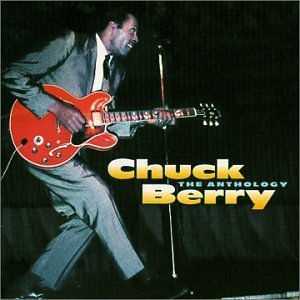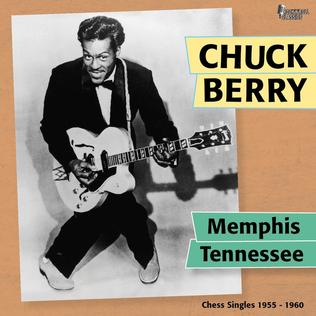
"Johnny B. Goode" is a 1958 rock song written and first recorded by American musician Chuck Berry. Released as a single, it peaked at number two on Billboard magazine's Hot R&B Sides chart and number eight on its pre-Hot 100 chart.

Three Dog Night is the debut album by American rock band Three Dog Night. The album was originally released by Dunhill Records on October 16, 1968. The album is known for featuring the band's Top 5 hit single, their cover of Harry Nilsson's song "One".

"Rock and Roll Music" is a song written and recorded by Chuck Berry. It has been widely covered and is one of Berry's most popular and enduring compositions.

"Back in the U.S.A." is a song written by Chuck Berry that was released in 1959 and was a top 40 hit. A cover version in 1978 by Linda Ronstadt was also a hit.

"Roll Over Beethoven" is a 1956 hit song written by Chuck Berry, originally released on Chess Records single, with "Drifting Heart" as the B-side. The lyrics of the song mention rock and roll and the desire for rhythm and blues to be as respected as classical music. The title of the song is an imperative directed at the composer Ludwig van Beethoven to roll over out of the way and make room for the rock and roll music that Berry was promoting. The song has been covered by many other artists, including the Beatles and the Electric Light Orchestra. Rolling Stone magazine ranked it number 97 on its list of the "500 Greatest Songs of All Time".
"Run Rudolph Run" is a Christmas song written by Chuck Berry but credited to Johnny Marks and M. Brodie due to Marks' trademark on the character of Rudolph the Red-Nosed Reindeer. It was published by St. Nicholas Music (ASCAP) and was first recorded by Berry in 1958, released as a single on Chess Records.

Anthology is a two-disc compilation album by American rock and roll musician Chuck Berry released on July 27, 2000, by Chess Records. It duplicates in its entirety the previous anthology The Great Twenty-Eight ranked at No. 21 on the Rolling Stone 500 greatest all time albums list, as well as the entirety of the later Definitive Collection issued in 2006 as part of the Universal series. The album was later reissued and packaged in 2005 as part of the Universal Records Gold series, and simply retitled Gold. It charted at No. 110 in the UK Albums Chart.

Rockin' at the Hops is the fourth studio album by rock and roll pioneer Chuck Berry, released in July 1960 on Chess Records, catalogue LP 1448. With the exception of four tracks, "Down the Road a Piece," "Confessin' the Blues," "Betty Jean," and "Driftin' Blues," all selections had been previously released on 45 rpm singles.

The London Chuck Berry Sessions is the sixteenth studio album by Chuck Berry, and consists of studio recordings and live recordings released by Chess Records in October 1972 as LP record, 8 track cartridge and audio cassette. Side one of the album consists of studio recordings, engineered by Geoff Calver; side two features three live performances recorded by the Pye Mobile Unit, engineered by Alan Perkins, on February 3, 1972, at the Lanchester Arts Festival in Coventry, England. At the end of the live section, the recording includes the sounds of festival management trying in vain to get the audience to leave so that the next performers, Pink Floyd, can take the stage; the crowd begins chanting "We want Chuck!". His backing band were Onnie McIntyre (guitar), Robbie McIntosh (drums), Nic Potter (bass) and Dave Kaffinetti (piano). Both McIntosh and McIntyre would later form The Average White Band.

"Sweet Little Sixteen" is a rock and roll song written and first recorded by Chuck Berry, who released it as a single in January 1958. His performance of it at that year's Newport Jazz Festival was included in the documentary film Jazz on a Summer's Day. It reached number two on the Billboard Hot 100, one of two of Berry's second-highest positions—along with Johnny Rivers cover of "Memphis, Tennessee"—on that chart. "Sweet Little Sixteen" also reached number one on the R&B Best Sellers chart. In the UK, it reached number 16 on the UK Official Charts. Rolling Stone magazine ranked the song number 272 on its list of the "500 Greatest Songs of All Time" in 2004. He used the same melody on an earlier song, "The Little Girl From Central" recorded on Checkmate in 1955.
"School Days" is a rock-and-roll song written and recorded by Chuck Berry and released by Chess Records as a single in March 1957 and on the LP After School Session two months later. It is one of his best-known songs and is often considered a rock-and-roll anthem.
"Wang Dang Doodle" is a blues song written by Willie Dixon. Music critic Mike Rowe calls it a party song in an urban style with its massive, rolling, exciting beat. It was first recorded by Howlin' Wolf in 1960 and released by Chess Records in 1961. In 1965, Dixon and Leonard Chess persuaded Koko Taylor to record it for Checker Records, a Chess subsidiary. Taylor's rendition quickly became a hit, reaching number thirteen on the Billboard R&B chart and number 58 on the pop chart. "Wang Dang Doodle" became a blues standard and has been recorded by various artists. Taylor's version was added to the United States National Recording Registry in 2023.

"Memphis, Tennessee", sometimes shortened to "Memphis", is a song by Chuck Berry, first released in 1959. In the UK, the song charted at number 6 in 1963; at the same time Decca Records issued a cover version in the UK by Dave Berry and the Cruisers, which also became a UK Top 20 hit single. Johnny Rivers's version of the song was a number two US hit in 1964.

Frederick Below, Jr. was an American blues drummer who worked with Little Walter and Chess Records in the 1950s. According to Tony Russell, Below was a creator of much of the rhythmic structure of Chicago blues, especially its backbeat. He was the drummer on Chuck Berry's song "Johnny B. Goode". He also recorded with J. B. Lenoir.
"Too Much Monkey Business" is a song written and recorded by Chuck Berry, released by Chess Records in September 1956 as his fifth single. It was also released as the third track on his first solo LP, After School Session, in May 1957; and as an EP. The single reached number four on Billboard magazine's Most Played R&B In Juke Boxes chart, number 11 on the Most Played R&B by Jockeys chart and number seven on the R&B Top Sellers in Stores chart in the fall of 1956.
"Brown Eyed Handsome Man" is a rock and roll song written and recorded by Chuck Berry, originally released by Chess Records in September 1956 as the B-side of "Too Much Monkey Business." It was also included on Berry's 1957 debut album, After School Session. The song title was also used as the title of a biography of Berry.
"Wee Wee Hours" is a song written and recorded by Chuck Berry in 1955. Originally released as the B-side of his first single, "Maybellene", it went on to become a hit, reaching number 10 in the Billboard R&B chart.

Love Theme from "The Godfather" is the twenty-ninth studio album by American pop singer Andy Williams, released on March 21, 1972, by Columbia Records. The two new songs on what was otherwise another LP of covers of hits by other artists were the title track and "Music from Across the Way", which came from the songwriters behind his recent hits "Happy Heart" and "(Where Do I Begin) Love Story".

"Little Queenie" is a song written and recorded by Chuck Berry. Released in March 1959 as a double A-side single with "Almost Grown", it was included on Chuck Berry Is on Top (1959), Berry's first compilation album. He performed the song in the movies Go, Johnny Go! (1959) and Hail! Hail! Rock 'n' Roll (1987). One year earlier, Berry had released "Run Rudolph Run", a Christmas song with the same melody.

"Reelin' and Rockin'" is a song written and recorded by Chuck Berry. It was originally recorded in 1957 and released as the B-side of "Sweet Little Sixteen".














